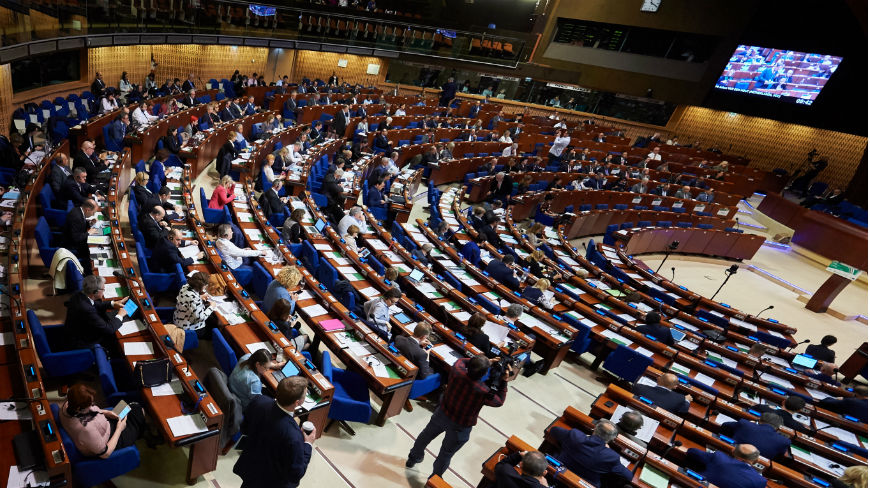Heavily involved in "open government", particularly in terms of procedural transparency and citizen participation, Europe’s regions are pursuing numerous initiatives in these areas, but can and must do even more. That was the conclusion of a debate held on 3 April 2019 during the Congress’s Chamber of Regions session.
Developed from 2011 onwards by the United Nations with the signing of the declaration on open government, the concept of "open government" was initially trialled in a small number of countries and has gone from strength to strength ever since. It has also been widely taken up and developed by many regions to the point where, according to the President of the Chamber of Regions, Gunn Marit HELGESEN (Norway, EPP/CCE), regional authorities are now the leading exponents of such initiatives within Europe.
Open government: definition and initiatives
Introducing the debates, Donatella PORZI, President of the Italian region of Umbria, and also of the Conference of European Regional Legislative Assemblies (CALRE), believes that open government offers "significant potential for improving all democratic processes". While open government is organised around three main strands, namely citizen participation, transparent decision-making and accountability of elected officials, Ms Porzi felt the list should be expanded to include the notion of trust and the independence of civil society from the government.
These principles, which make for more effective public policies, are also central to the notion of "digital citizens", well trained and knowledgeable, capable of participating in decisions in a transparent manner. Umbria has also developed various digital citizen initiatives, including a dialogue platform for upper secondary school students, "PeoSchool", which helps them to learn about Europe and functions as a virtual "European Parliament" in which they sit as MPs. Similarly, the region has introduced a digital agenda for its elected representatives, which allows them to familiarise themselves in advance with all the major issues being addressed, and which will soon also be accessible to the public via the Internet.
New relationship between regions and citizens
David GOESSMANN, a policy analyst with the OECD's Public Governance Directorate, gave an overview of his organisation's work on open governments, which he believes foreshadow the advent of "open states". He outlined a few regional initiatives adopted in OECD member states, including citizens’ councils which bring together randomly-selected people to discuss all the major issues of regional concern facing Belgium’s German-speaking community.
Luis PETRIKORENA ARBELAIZ, “open government” director within the Presidency of the Government of the Basque Country (Spain), sees open government as a “window of opportunity for participation” and a way to improve interaction between citizens and all levels of local and regional governance. However, while it is a valuable “aid” to democracy, open government alone cannot guarantee its long-term survival.
In the debate that followed these presentations, members of the Chamber had an opportunity to present numerous open government initiatives adopted by their regions: these included citizens' conferences on the integration of refugees in Lower Saxony or on air pollution in Stuttgart (Germany), a platform for dialogue on the environment set up by the Georgian capital, Tbilisi, and the regular publication, online, of open budgets by the authorities in the Russian region of Leningrad. Another example from the Russian Federation was presented by Farid MUKHAMETSHIN, now an honorary member of the Congress, who explained how the Republic of Tatarstan has digitised documents and access to 250 public services, thereby improving transparency and reducing waiting times for citizens. Today, thanks to secure blockchains, it is even possible to register land ownership certificates online.
Consult people, but listen to them too!
The provision of effective tools and the development of dialogue with citizens are not the only requirements for successful open government, however. As Karl-Heinz LAMBERTZ (Belgium, SOC) pointed out, while citizen participation processes are now essential because "elections alone are no longer enough", care must be taken to ensure that public consultations are genuinely followed up, as otherwise they are liable to create a strong sense of frustration. "Considerable care must be exercised when choosing topics and participants, and checks carried out to ensure participants have sufficient expertise, so that they can then be included in the final decisions," he said.
Nor should it be forgotten, noted Andrew DAWSON, (United Kingdom, ECR/CRE), that there are limits to transparency, as some commercial negotiations must remain confidential in the interest of the buyers themselves, including when they are governments. Lastly, numerous youth delegates also took part in the debates: often from youth councils and assemblies, these delegates are eager to have a greater voice in regional open government procedures, particularly as they represent the future of European democracy.
- Speeches by:
- Donatella PORZI, President of the Conference of European Regional Legislative Assemblies (CALRE) and President of the Legislative Assembly of Umbria, Italy
- David GOESSMANN, Policy Analyst of the Public Governance Directorate of the Organisation for Economic Co-operation and Development (OECD)
- Luis PETRIKORENA ARBELAIZ, Director of “Gobierno Abierto”, Presidency of theGovernment of the Basque Country, Spain
- Mediabox Interview
- Videos of the debate:
Donatella PORZI - David GOESSMANN - Luis PETRIKORENA ARBELAIZ
*** 36th Session of the Congress ***




